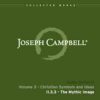Works by Campbell: Audio Lectures Series II
Audio Lecture Series II
Lectures from the middle of Campbell’s career, starting just after the moon landing in 1969 and counting to the late 1970s.
Series II consists of six volumes, each with between five and eleven audio lectures (at about 60 minutes each).

Volume 1: A Brief History of World Mythology
Volume 2: Mythological Perspectives
Volume 3: Christian Symbols and Ideas
Volume 4: Psychology and Asia Philosophies
Volume 5: Your Myth Today
Volume 6: Mythic Ideas and Modern Culture
New! Series II is now available as a megabundle!
Get all 37 lectures in Series II (normally $5.99 each) for $169.99. That’s a savings of $48.64…
$169.99Add to cart
Volume 1: A Brief History of World Mythology
In Series II.1 Joseph Campbell provides a “brief history of World Mythology” by introducing us to the functions of Mythology and how the functions differ from East to West. Lectures include an interpretation of the sound of AUM, how Buddhism works in China, Jung, Thomas Mann, James Joyce, Grail Mythology, the relationship of schizophrenia and shamanism to the Hero Journey, and other topics. This tour de force is Joseph at his best.
Unique among the volumes in the Joseph Campbell Audio Collection, this collection includes eleven separate recordings from a single week-long workshop — all recorded at the renowned Esalen Institute in Big Sur, California. “A Brief History of World Mythology” provides over twelve hours of Campbell covering his subject as no one else could.
Get the eleven lectures in Series II, Volume 1 (normally $5.99 each) for $60. That’s a savings of $5.89…
$60.00Add to cart
Or explore each lecture individually…
Mythological Conclusions (Audio: Lecture II.1.11)
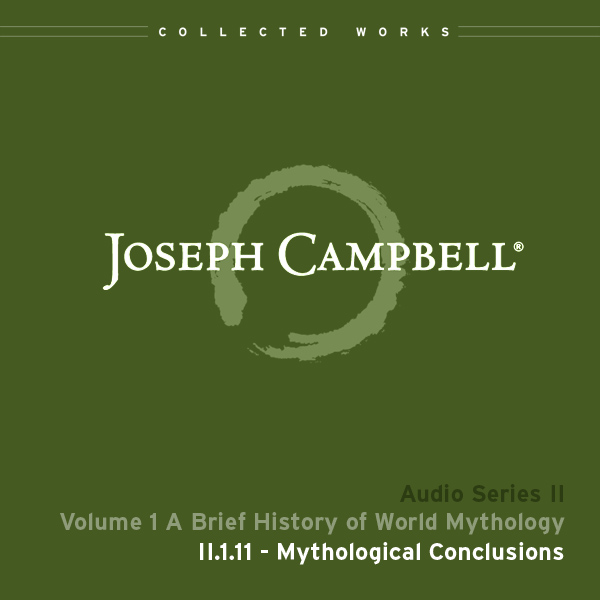
In this talk, never before commercially released, Joseph Campbell sums up the subject that he has been exploring: a brief history of world mythology. He then moves on to discussing with his audience the ways in which myth and modern culture will affect each other. This series was recorded at the Esalen Institute in Big Sur, California during the summer of 1969, immediately following the Apollo 11 landing on the moon.
Birth of the Modern (Audio: Lecture II.1.10)
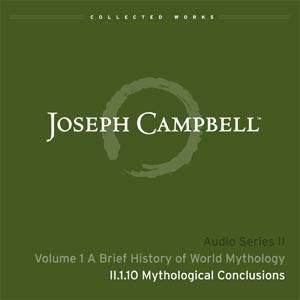
In this talk, Joseph Campbell explores way in which myth expressed itself in the first cities, in classical India and East Asia, and in the birth of our modern world. This series was recorded at the Esalen Institute in Big Sur, California during the summer of 1969, immediately following the Apollo 11 landing on the moon.
Birth of the Perennial Mythology (Audio: Lecture II.1.9)
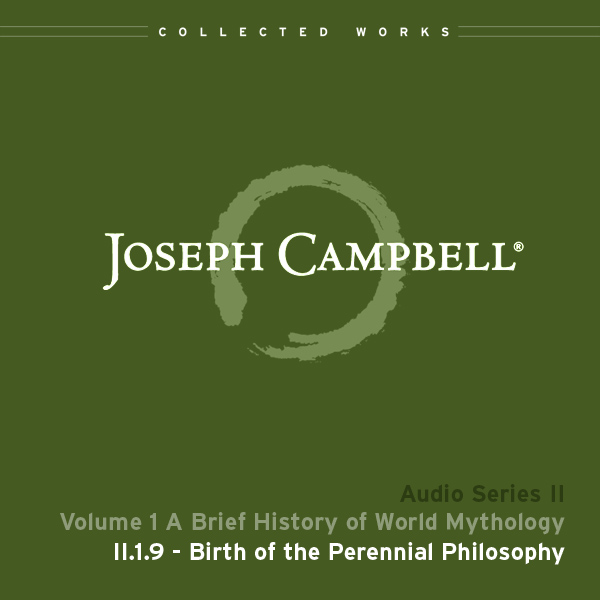
In this talk, Joseph Campbell explores way in which myth expressed itself in the earliest human cultures. This series was recorded at the Esalen Institute in Big Sur, California during the summer of 1969, immediately following the Apollo 11 landing on the moon.
Grail Mythology (Audio: Lecture II.1.8)
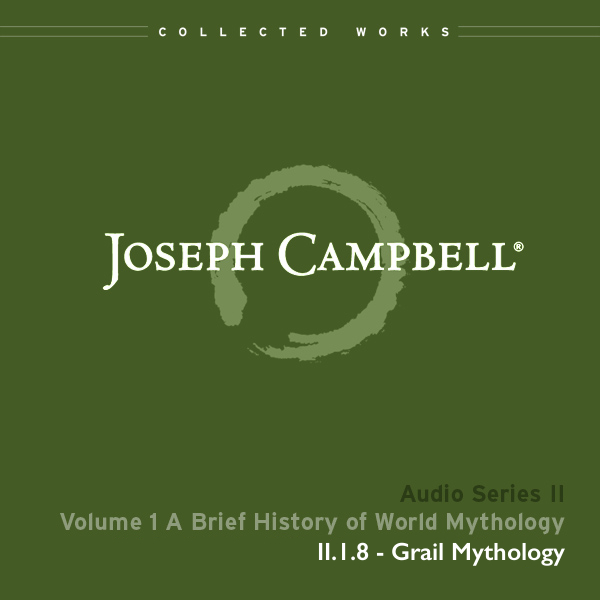
In this talk, Joseph Campbell explores the Arthurian tales of the Grail--both in their humanist form, featuring the quest of the unsophisticated Sir Parzival, and in their spiritual form, featuring the quest of the unearthly Sir Galahad. This series was recorded at the Esalen Institute in Big Sur, California during the summer of 1969, immediately following the Apollo 11 landing on the moon.
Thomas Mann and James Joyce (Audio: Lecture II.1.7)
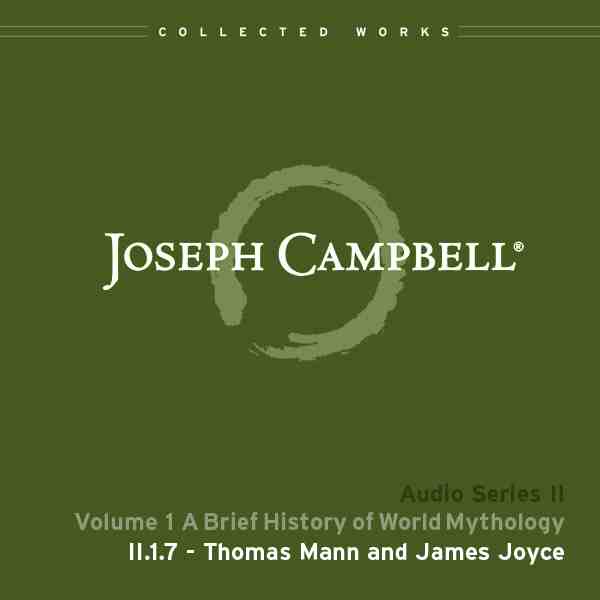
In this talk, Joseph Campbell explores the mythologically inflected novels of Thomas Mann and James Joyce. This series was recorded at the Esalen Institute in Big Sur, California during the summer of 1969, immediately following the Apollo 11 landing on the moon.
Jung: Myth and Shadow (Audio: Lecture II.1.6)
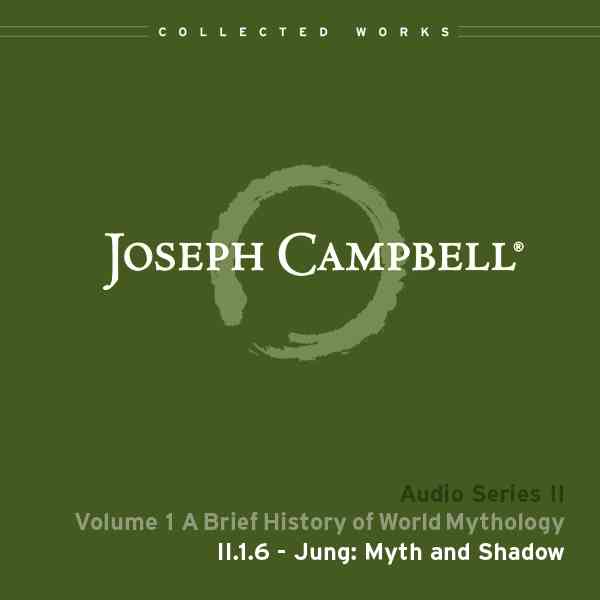
In this talk, Joseph Campbell explores the connection between mythology and the depth psychology of Carl Jung.
Shift to Western Psychology (Audio: Lecture II.1.5)
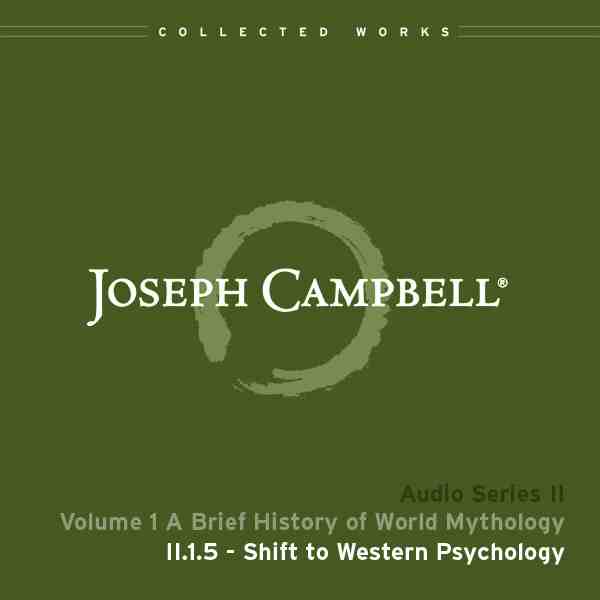
In this talk, Joseph Campbell begins looking at the psychological underpinnings of myth, and the way in which the modern revolution in psychiatric knowledge led by Freud and Jung has altered our view of the world, and of ourselves.
Buddhism in China (Audio: Lecture II.1.4)
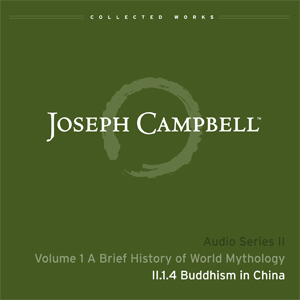
I suppose if you were to try to invent two peoples at opposite poles of any spectrum you chose, Chinese and Hindus would be perfectly good candidates for the opposition. [...] Think of the Indian world, the jungle and the heat, and the vegetal emphasis in the environment. And then the Chinese in the realms of the deserts and the animal world, and a background of nomadism and the hunt. The Indians loving wild, vast imaginations. And the Chinese: very practically oriented. —Joseph Campbell In this talk, Joseph Campbell continues his exploration of the world's great mythological traditions by exploring the mythologies of China, starting with the indigenous traditions, Confucianism and Taoism, and then continuing to discuss the way in which China's particular mythic culture took in the Indian tradition of Buddhism and transmuted it into something new and uniquely East Asian.
The Sound AUM and Kundalini Yoga (Audio: Lecture II.1.3)
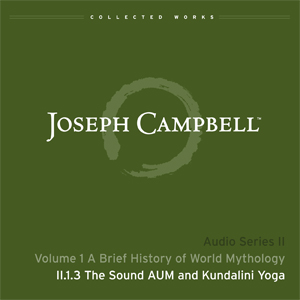
All of these possibilities are before you. And then... when you come down finally to the last, you are born. And this little thing comes into the world, ignorant of all that it has experienced. It has been through the spheres of the gods and the light. And it comes out in darkness: the darkness and avidity... of the first chakra. That’s the great cycle of the tantric spheres.—Joseph Campbell By telling the tale of the ascent of the kuṇḍalinī serpent through the seven cakras or wheels of the spirit-body, Joseph Campbell explores the world of Tantra in its many forms—from the Bhagavad Gīta to the Bardo Thodol (the so-called Tibetan Book of the Dead) to Sukhavātī, the Western Paradise of the Amida Buddha, Campbell leads us on a hero journey through the heavens and hells of this great spiritual tradition.
Mythology East and West (Audio: Lecture II.1.2)
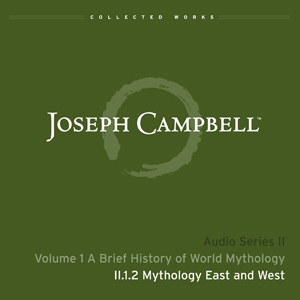
"'Tat Tvam Asi'. You are it. That mystery which you seek to know, which you look for outside, which you project into personifications such as Yahweh, is your own very being, and looking for it out there you are losing it because you are committing yourself to a notion of relationship, of dualities, of entities which absolutely obscures the mystery." Joseph Campbell explores the ways in which Eastern and Western thought overlap, and the ways in which they diverge.
The Function of Mythology (Audio: Lecture II.1.1)
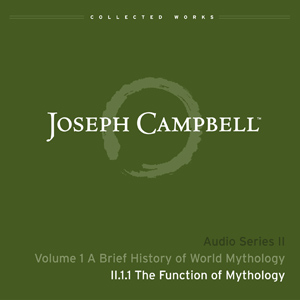
...the origin of the mythological symbols is not pseudo-scientific, pseudo-historical. They spring from the psyche. They are not the consequence of observations, they are the consequence of observations misinterpreted through projections from the human psyche... the imagery of myth is the imagery through which our own nature, our own conscious nature, communicates with our consciousness, and they have in the past, when the symbols have been received simply and naively without criticism, operated to keep the conscious programs and life in touch with the unconscious motivations, but when these symbols are removed, as they have been for us, there takes place a disconnection. -- Joseph Campbell Joseph Campbell provides a detailed explanation of the four traditional functions of mythology. He shows how myths put us in touch with the richest dimensions of our lives, even as our inclination to interpret them literally -- that is, as scientific or historical facts -- disconnects us from their true power. Campbell then argues that, if myths are to continue to fulfill their vital functions in our modern world, they must continually transform, evolve even as the world does; for our older mythologies, untransformed, simply do not address the realities of contemporary life. Running time: approx. 60 minutes
Volume 2: Mythological Perspectives
In this series, Joseph Campbell offers an overview of world mythology through a variety of lenses. The topics range from Christianity to the East, including a lecture that ties Carl Jung and Buddha into similar realms. The final question is “What is Your Myth Today?”
Get the five lectures in Series II, Volume 2 (normally $5.99 each) for $25. That’s a savings of $4.95…
$25.00Add to cart
Or explore each lecture individually…
Creative Mythology (Audio: Lecture II.2.5)

It is impossible to communicate an experience to someone who has not had the experience. Try to communicate the experience of skiing down a wonderful mountain slope to someone who has never been on skis. Try to communicate the experience of being in love when it happens to people who have never known this experience. It cannot be done. You can speak only by analogy. For a system of mythological symbols to work it must be operating in the field of a community of people who have essentially analogous experiences otherwise nothing is happening there. — Joseph Campbell Joseph Campbell was often asked how a new mythology was going to develop. His answer was that it would have to come from poets, artists, and filmmakers. In this talk, Campbell explores what he called creative mythology — the way in which artists can and do give a sense of the transcendent in a universe apparently empty of meaning. This lecture was recorded at Beloit College in Beloit, Wisconsin in 1969.
Psychosis and the Hero's Journey (Audio: Lecture II.2.3)
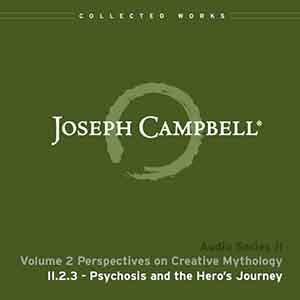
Each one brings the myth right out of himself. And what the analyst does is help you recognize it as the image carrier of your own affects, your own energies. The value of the psychiatrist is that he helps you to relate your own images to your own affects, to your own energy system. And the reason you're in trouble is that you don't realize this. — Joseph Campbell Michael Murphy of the Esalen Institute brought together psychiatrist John Weir Perry and renowned mythologist Joseph Campbell for this explosion of ideas. As the talk begins, Perry has already laid out his view of the progress of schizophrenic psychosis. Campbell proceeds to how Weir Perry's the experiences of Weir Perry's patients show their progress — or failure — along the Hero's Journey: the path that he himself had explored in relation to myth and dream in his 1949 masterpiece The Hero with a Thousand Faces. Campbell explains that he had never had any interest in schizophrenics for himself, but that “I didn’t know that my friends were of that order.” This lecture is humorous, informative, thought-provoking, and illuminating. Not to be missed! This lecture, to which Campbell referred often in his later work, was recorded at an Esalen Institute event in San Francisco, California in 1968.
Mythology in the Modern Age (Audio: Lecture II.2.4)

Whereas in the ancient world one could speak of two mythologies -- the mythology of the people staying in the village, doing as they were told, guarded by the village compound and the village gods, and the mythology of those who ventured into the forest of adventure for individual hero experiences -- today we can speak of only one mythology because there is no village compound. The tide has broken in. — Joseph Campbell In this talk, Joseph Campbell looks at the ways in which mythologies must adapt to maintain their relevance in a world far removed from the ancient times in which they were born. Looking at how some of the functions of myth have been taken on by different segments of society, he explores the fractured spiritual landscape of the modern world, and the ways in which to heal those fractures. This lecture was recorded at Syracuse University in Syracuse, New York in 1968.
Mythic Themes in Literature and Art (Audio: Lecture II.2.1)
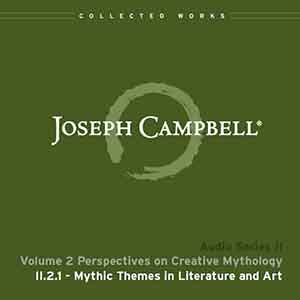
Creative mythology, then, is the rendition of images, of life, of poetic statements, of the orders that you perceive underlying the purposes of the world in terms of your experience. — Joseph Campbell In this talk, never before commercially released, Joseph Campbell looks at what it means to having a living mythology — one that performs all of myth's functions for the individual and for society. In particular, he looks at our modern dilemma, trying to reconcile ancient myth with modern science, and points to what he calls creative mythology as the only possible response. This lecture was recorded at the University of New Hampshire on November 30, 1967, as he was writing the book Masks of God: Creative Mythology.
Hermes, Alchemy, & the Voyage of Ulysses (Audio: Lecture II.2.2)
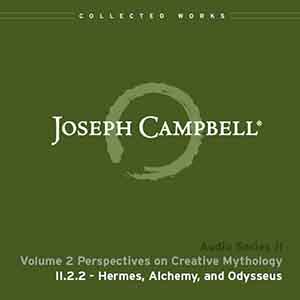
Hermes is the lord of the road to rebirth. He is the one who meets the soul at death and guides the path to eternal life of one kind or another. In that way, he is the lord also of roads, the protector of travelers. These are his hitherworld functions. — Joseph Campbell Have you ever dreamt about water? About cruising or taking a voyage? By pulling together three ideas (the god Hermes, the concept of Alchemy and the story of Odysseus,) Joseph Campbell takes us on a mythic voyage across the oceans of our mind. Listen to Odysseus’ Soul Journey and come hear of the Cyclops Polyphemus and to top it all off, Joe offers it all in modern psychological imagery by explaining Thomas Mann’s Hermetic pedagogy. This lecture was recorded at the Esalen Institute in Big Sur, California in 1968.
Volume 3: Christian Symbols and Ideas
Beginning with the symbols of the Christian faith, Campbell explores medieval history from the perspective of Tarot deck. Discussions of mythic images, mythic goddess, and alienation and rapture offer a deep look into Campbell’s unique view of such topics.
Get the five lectures in Series II, Volume 3 (normally $5.99 each) for $25. That’s a savings of $4.95…
$25.00Add to cart
Or explore each lecture individually…
Mythologies of Alienation and Rapture (Audio: Lecture II.3.5)
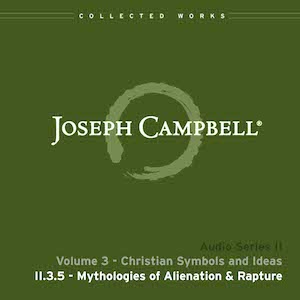
Whether there is a God, whether one can be united with God, whether one can transcend God, and all that, it's a perfect matter simply of vocabulary. And since the ultimate mystery of being transcends all oppositions, it also transcends the opposition of mystery of "there is a God" and "there isn't a God." So no matter how you're thinking about it, just remember you're thinking about something that can't be thought about. — Joseph Campbell Joseph Campbell examines the concept of duality and its expression in Christianity, as compared to Kundalini yoga, psychology, and psychedelic experiences. This lecture was recorded at an Esalen Institute workshop in New York, NY in 1971.
The Mythic Goddess (Audio: Lecture II.3.4)

All I can tell you about mythology is what men have said and men experience. And now women have to tell us from their point of view what the possibilities of the feminine future are. And it is a future. It's as though the lift-off had taken place. It really has. There's no doubt about it. — Joseph Campbell In this lecture centered on the feminine, Joseph Campbell presents the many roles that the Goddess has played in different mythologies through the millennia. This lecture was recorded at Sarah Lawrence College in Bronxville, NY in 1972.
Tarot & the Christian Myth (Audio: Lecture II.3.2)
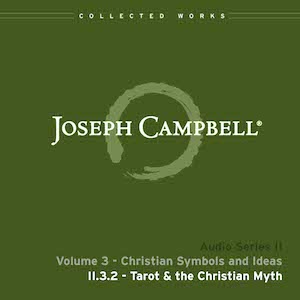
The wheel of fortune is usually represented as a revolving wheel with a person up here in victory, in triumph. A person here on the way down, the depression, the crackup, the falling stock market. The person down here in the abyss. The person here on the way up. These are the four situations of fortune. Falling fortune, the abyss, rising fortune, and triumph. You are not to identify yourself with your fortune. You must know the center. And this is usually held by a goddess, the goddess Fortuna who is the same as Lakśmi, the goddess of fortune that supports the kings in India. — Joseph Campbell Here Joseph Campbell delves into the mythological symbolism of the traditional tarot deck. After showing that the four suits of the minor arcana correspond to the four classes of traditional society, he goes on to unlock the spiritual significance of the cards of the major arcana, showing that, in fact, they represent an initiation into ancient spiritual lessons. This lecture was recorded at the Esalen Institute in Big Sur, California in 1971 and 1975.
Symbols of the Christian Faith (Audio: Lecture II.3.1)
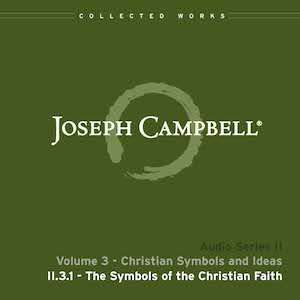
Why do we yearn? What is it we yearn for? It's for something that was never on land or sea. And this is a peculiar European romantic thing. And that is the fulfillment of this special intelligible potentiality which is our own being and character. — Joseph Campbell In this talk, Joseph Campbell looks at the mythic underpinnings of one of the world's great mythic traditions: Christianity. He explores the religion's historical and mythological roots, and discusses why it is that churches are struggling to keep their faith truly alive. This lecture was recorded at Trinity Presbyterian Church in 1971.
The Mythic Image (Audio: Lecture II.3.3)
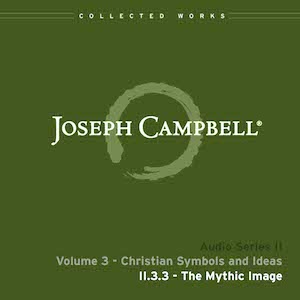
These are the principal archetypes, I would say, in the Jungian psychological opus: the center; the figures representing the functions -- sensation, thinking, and so forth; the personae, these are culturally conditioned; the anima/animus, also very strongly culturally conditioned; the ego, the center of consciousness; the shadow, the threat, the Freudian personal unconscious which is a function of your own biography and then the problem of the interaction of these. — Joseph Campbell Joseph Campbell delves into the compelling psychology of Carl Jung, including how psychological functions manifest, both consciously and unconsciously, in individual experience. This lecture was recorded at the Mann Ranch in Ukiah, California in 1972.
Volume 4: Psychology and Asian Philosophies
In Volume 4, Campbell delves deep into the relationships involving Sigmund Freud, Carl Jung, and the concepts involved in Kundalini Yoga. His thoughts on aesthetic realization, Dante’s “La Vita Nuova” and his thoughts about women as the goddess, the universe. Whether it’s Yoga in relation to modern psychology or the chakras of transformation, he is unparalleled in his clear concise blending of these ideas. In the last lectures of this Volume, he relates the archetypes to mythology and closes out by offering a detailed look at the four aims of Indian life.
Get the five lectures in Series II, Volume 4 (normally $5.99 each) for $25. That’s a savings of $4.95…
$25.00Add to cart
Or explore each lecture individually…
Four Aims of Indian Life (Audio: Lecture II.4.5)
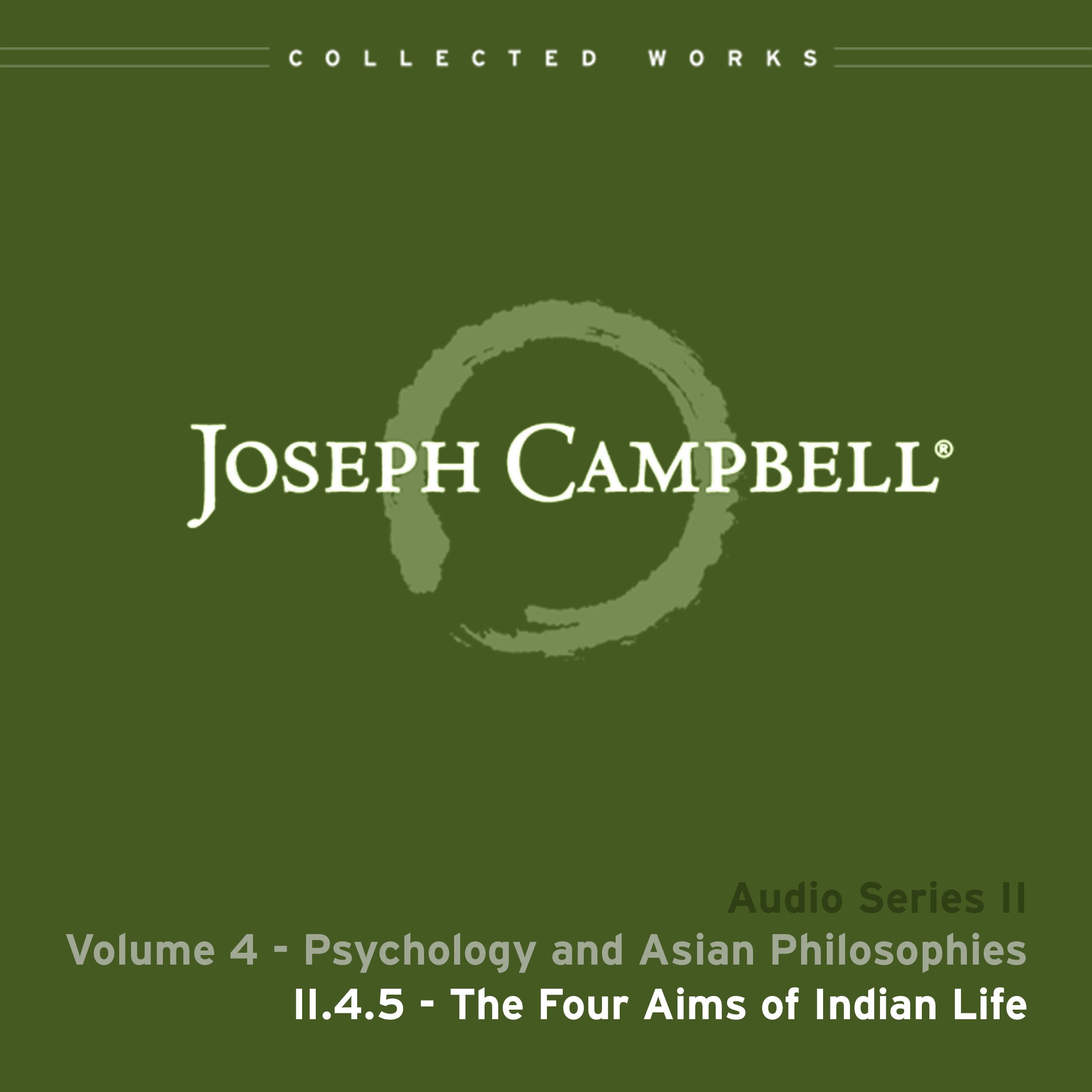
The first encounter of the West with this type of yoga was that of Alexander the Great. When he arrived in Taxila, in 327 B.C., he and his young officers heard that there was a school of philosophers just outside the town. And they determined to go pay a visit. That's to say, the young officers did. They had all been students of Aristotle and Plato and so forth. And they thought they were going to have an interesting conversation with like-minded Oriental spirits.. -- Joseph Campbell Joseph Campbell covers the four Aims of Indian life by sharing a series of ancient Indian tales. Each is as delightful, spellbinding and illuminating as the next. And with his expert interpretation as the elements are revealed, you get a unique insight into his mastery of the mythological material he explored throughout his life This lecture was recorded at the Asia Society in New York, NY in 1968.
Archetypes & Mythology (Audio: Lecture II.4.4)
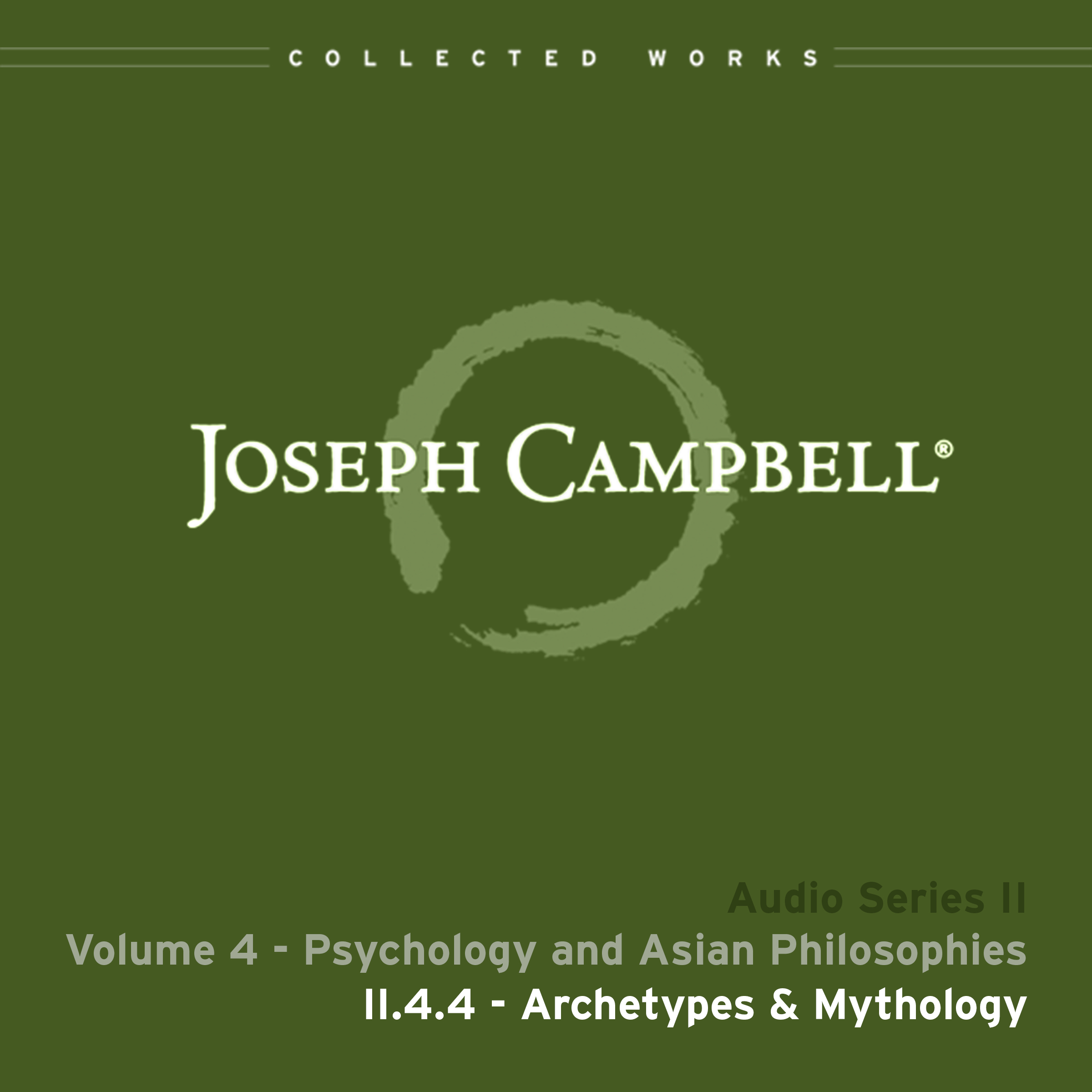
You ask about eternal life. Shall I be alive after death? This is lunar eternity. This is a long time. The eternity is that dimension which the screen of time shuts out. The obscuring power of maya shuts out the dimension and knowledge and everything else of eternity.. -- Joseph Campbell Carl Jung gave us a modern concept of archetypes and mythology but it is Joseph Campbell work that explains and inter-relates the two ideas together. From the heavenly realms, through the Tibetan karmic winds and Lord of Judgment, Joe walks us towards a rebirth and blend of psychology with Asian philosophies. This lecture was recorded at the Mann Ranch, Ukiah, CA in 1972.
Freud Jung & Kundalini Yoga Part 3 (Audio: Lecture II.4.3)
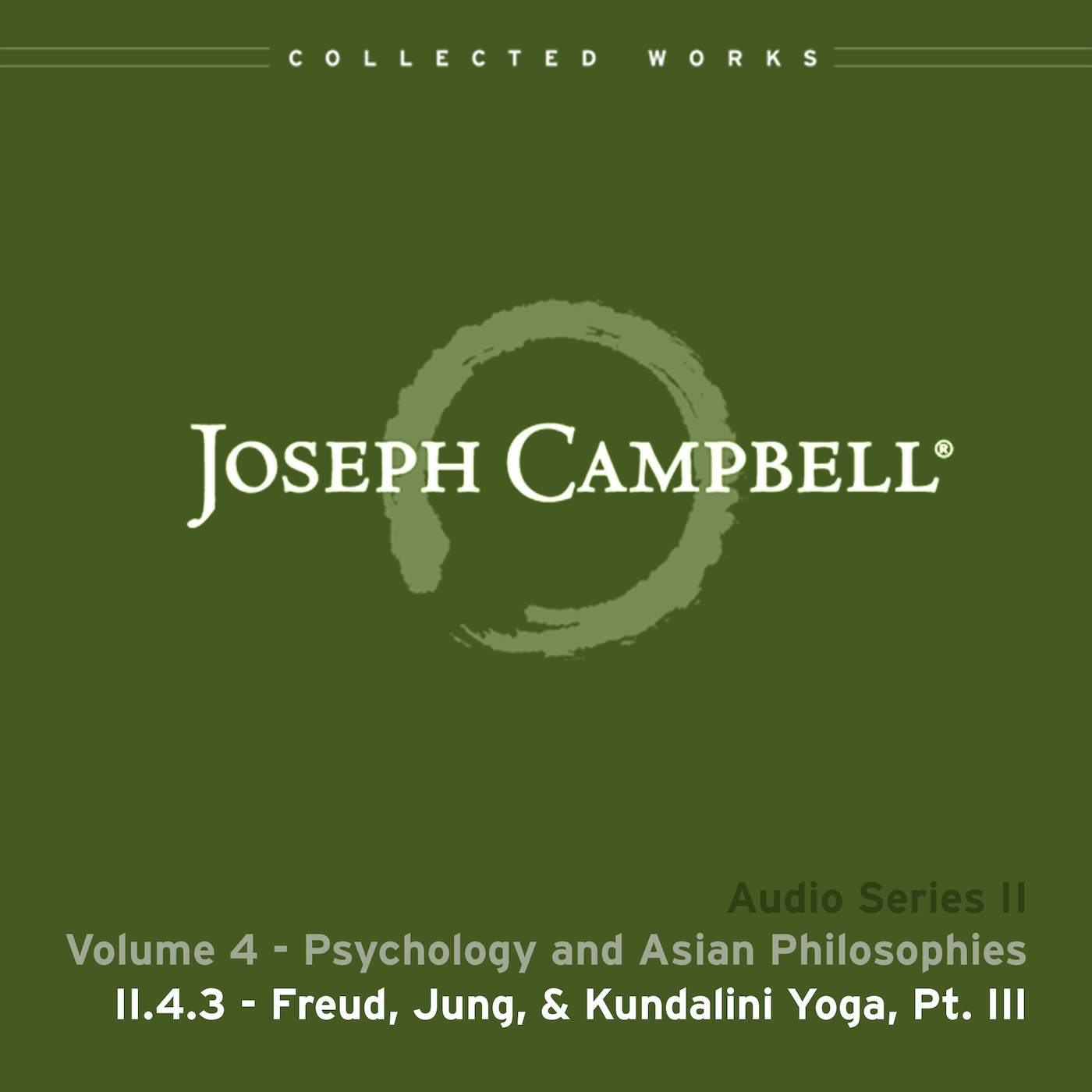
As I said to begin: life, the universe and all things are first and last absolutely without meaning. And this term of the Buddha, the tathagata, the one 'thus come,' points to that. As soon as the symbols have to be explained they have lost fire.-- Joseph Campbell In the final lecture dealing with Freud Jung and Kundalini Yoga, Joseph Campbell explains the functions of mythology as they relate to traditional mythology. And ties it together with the explanation of AUM. This is the culmination of eastern yoga as it meets western psychology. This lecture was recorded at the Esalen Institute in 1966
Freud Jung & Kundalini Yoga Part 1 (Audio: Lecture II.4.1)

One can take anything - this watch - draw a ring around it. Forget that you know how to use it. What is it? The mystery of the being of this object is exactly the same as the mystery of the being of the universe. -- Joseph Campbell In part 1 of this 3 part lecture, Joseph Campbell brings together the fundamentals of Kundalini Yoga and modern depth psychologists. He lays the foundation of the chakras and other major eastern perspectives before delving into western perspectives in part 2. This lecture was recorded at the Esalen Institute in 1966
Freud Jung & Kundalini Yoga Part 2 (Audio: Lecture II.4.2)

Everywhere you turn you find the same myths . . . not always with the same emphases . . . but the same symbols. How is it that these symbols keep returning? There are two basically contradictory answer. One is psychologically based and the other is historically based. -- Joseph Campbell In part 2 of this 3 part lecture on western psychology and Kundalini Yoga, Campbell starts below chakra four and contrast the yoga perspective with perspectives from Freud and Jung. He covers relations with your mother and the powerful difference between boys and girls. This lecture was recorded at the Esalen Institute in 1966
Volume 5: Your Myth Today
The ever changing story of mythology is brought to us with a modern perspective by Joesph Campbell. In this volume, he talks of mythology of today, his thoughts on how it relates to violence in America. Whether it’s life, literature, art or “The Way of Beauty” you don’t want to miss his 20th century perspective on the ageless story of man!
Get the six lectures in Series II, Volume 5 (normally $5.99 each) for $30. That’s a savings of $5.94…
$30.00Add to cart
Or explore each lecture individually…
The Way of Beauty (Audio: Lecture II.5.6)
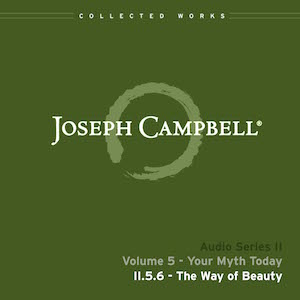
And so we come to the next part of the problem: what about aesthetic arrest, what about the static? Well Joyce turns for his authority here to Aquinas. And Aquinas speaks of three moments ... in the rendering of an aesthetic experience of the proper sort. He uses three Latin words: integritas, consonantia and claritas. -- Joseph Campbell Joseph Campbell describes how "The Way of Beauty" is approached via the aesthetic experience. Perhaps it's India art, or the way of Yoga, or Thomas Mann and James Joyce who peak your curiosity about "the Way of the Artist." No matter what your experience or approach, you’ll enjoy Campbell's closing recitation of "Natural Beauty," by poet Robinson Jeffers. This lecture was recorded at the Jung Institute - San Francisco in 1984
The Mythic Approach to Life Literature & Art (Audio: Lecture II.5.5)
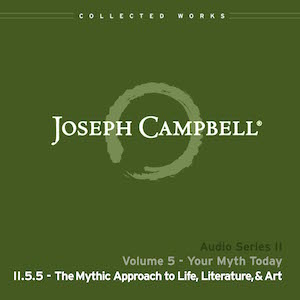
In India the ultimate mystery is defined in three terms: being, consciousness, and bliss. Where your bliss is, there's your adventure. And it will be a bliss that will involve pain. It will involve excruciating suffering. But where the bliss is, is the call. And that I give you as my word of good wishes that you will have the spunk, the guts to follow your own lead. And don't do as you're told. -- Joseph Campbell From the sun, moon, stars and earth, mankind tries to give meaning to life through literature and art. Joseph Campbell brings these topics into focus by describing mystical functions and attitudes, then sharing Dantes view, the love of a troubadour, and a story of Parzival and the wounded king, and how these relate to fulfilling your "intelligible character." This is a lecture not to be missed! This lecture was recorded at the Kent State University in 1975.
Cosmology and the Mythic Image (Audio: Lecture II.5.4)
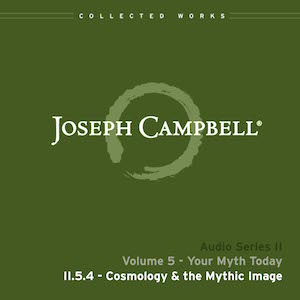
There is a beautiful saying by Novalis: The seat of the soul is there where the inner world and the outer world meet. This is the secret of all myth. The imagery of myth is supplied from the out of the world, outer world, outer space. It comes by way of the senses to the mind. But the image does not become mythologized until it meets the message from the heart. -- Joseph Campbell How do you talk about the universe, the big bang of creation, light years, archetypes, mythology, and the heliocentric universe in one lecture? Campbell pulls from many sources and blends them into a wonderful telling of a view of the universe, then ends with a story of Indra Purana, much to the audience's delight. This lecture was recorded at the Jung Institute - San Francisco in 1983.
Androgyne as Mystical Symbol (Audio: Lecture II.5.3)
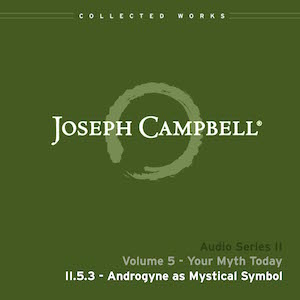
My subject tonight is the androgyne as mystical symbol. And the first point I want to make before engaging in the argument is that a symbol derives from the psyche, speaks to the psyche by way of reflection from apparently outside forms. And one of the greatest mistakes made in the interpretation of symbols is to think that they are references to historical concrete actualities. -- Joseph Campbell This lecture offers the viewpoint of androgyny being incorporated in people's bodies by artificial means. While Campbell walks us through the concept as covered by art through the centuries, his description of various slides (not included) paint vivid images in our minds. Be it Kali (the black one), artifacts excavated in Catal Huyuk, or images from the mystery religions appearing on the Pietroasa bowl, you'll be one in spirit at the end of this lecture. This lecture was recorded at the Jung Institute (New York) in 1980.
Mythologies New, Old & Today (Audio: Lecture II.5.1)
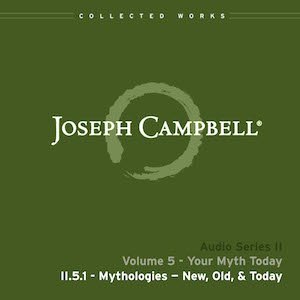
When people ask me what is the myth today, I always have the feeling there is no myth, there can be no myth anymore. A mythology requires a homogeneous population, a group of people within a horizon who will have had equivalent experiences for whom certain specific images will continue to have, independently, the same sense, the same meaning, the same affect value. Whereas in our world, with the great miscellaneous people in this room, I dare say there are so many different backgrounds here that your responses to images would be quite particular to yourselves, so each of us is, as it were, thrown into the requirement to develop out of his own depth, to learn what his own driving grounds are, and you can't take them from elsewhere. -- Joseph Campbell Campbell explains how "Man" is viewed as the giver of meanings, the source of all the gods and all the hells, and is that One who must be recognized today, in love, as the sign to yourself of your transcendence of your own secondary ego. He takes us through the interior life of humans today and relates that to primitive myths, mysticism, and, more recently, flights in space. This lecture was recorded at the Blaisdell Institute - Claremont Colleges in 1975.
Myth & Violence in America (Audio: Lecture II.5.2)
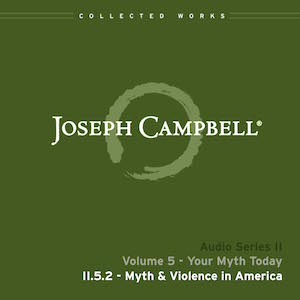
A movement from what Spengler called culture to civilization ... is marked by revolutions and radical transformations of culture, where everything that had been natural became a problem, intellectually considered, criticized, and taken apart. And he equates the terminal period of the revolution age with our period and with the Hellenistic period, after which you have the rise of the Roman Empire, the Caesars, and the second religiousness. This dawn period in Spengler's view - and I think he demonstrates it very clearly - is characterized by the emergence of an architecture profoundly inspired in a religious sense, which gives the pitch, which gives the tone and sign that is to be developed then, through a period of about a thousand years in history, of the ensuing culture form. -- Joseph Campbell As the debate rages about what to do with the violence in America that ranges from guns to terrorism, domestic violence to child abuse, Joseph Campbell compares various cultural stages, offers different view points, and shares his views on mythic thinking in this world. He also discusses recent travels through Switzerland, Italy, Germany and France, comparing those cultures with his life in New York City. This lecture was recorded at the Diablo Valley College, Pleasant Hill, CA in 1975
Volume 6: Mythic Ideas and Modern Culture
Joseph Campbell presents mythic ideas and concepts with a unique perspective of modern cultures. As he discusses art and it’s relationship to mythology today, he explores the confrontation of religion and society and addresses the concept of “The Psychological Basis of Freedom.” These lectures continue to illuminate and enlighten us as we move forward in the 21st century.
Get the five lectures in Series II, Volume 6 (normally $5.99 each) for $25. That’s a savings of $4.95…
$25.00Add to cart
Or explore each lecture individually…
Mythology of Today (Audio: Lecture II.6.3)
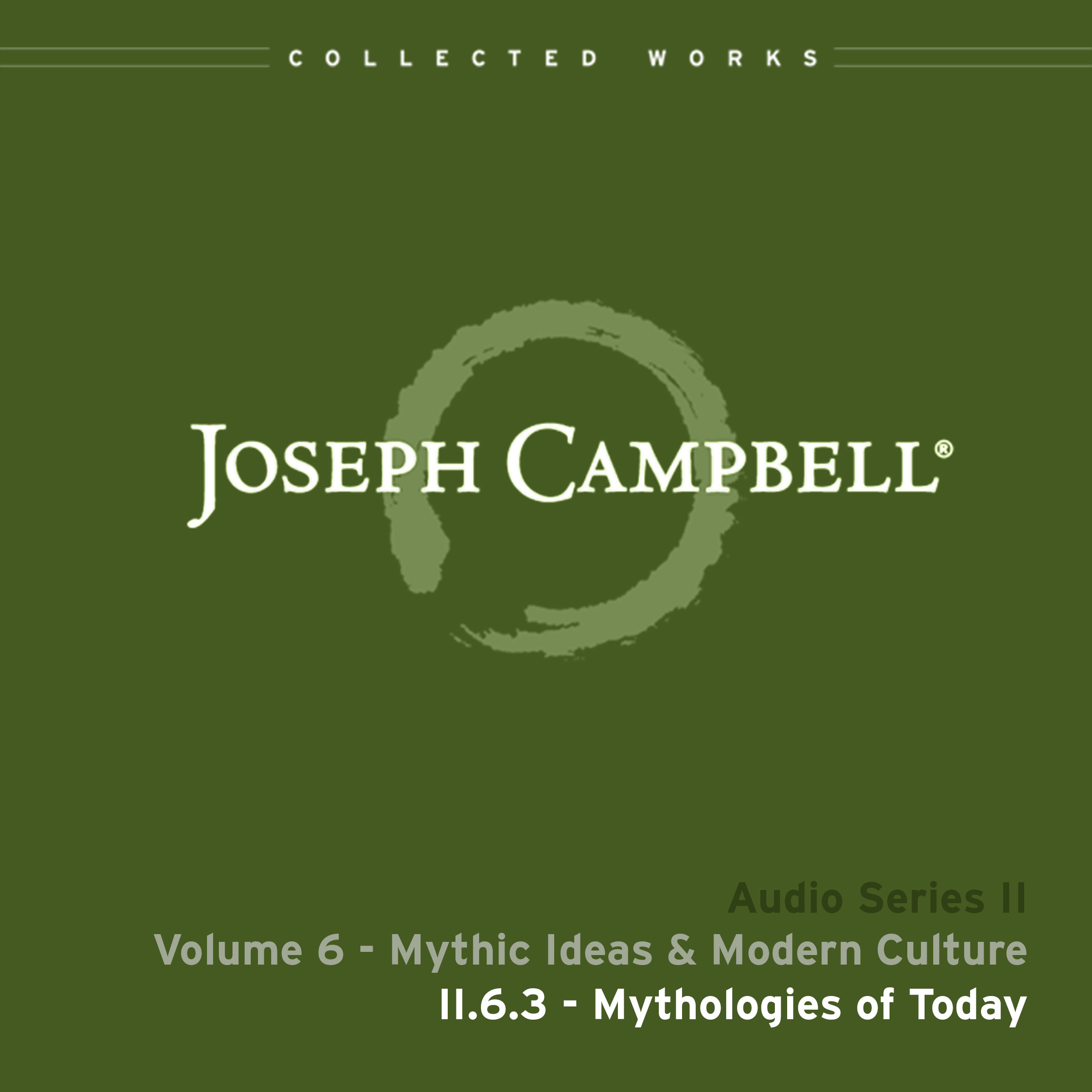
Joseph Campbell explores the Grail Legend and the cosmological function of mythology, offering us a unique perspective on “Mythology Today”. Listen as he describes the Levantine forms that collided with Europe and how that takes us to the three ages of spirit. This is Campbell doing what he does best!
Confrontation - Religion & Society (Audio: Lecture II.6.4)
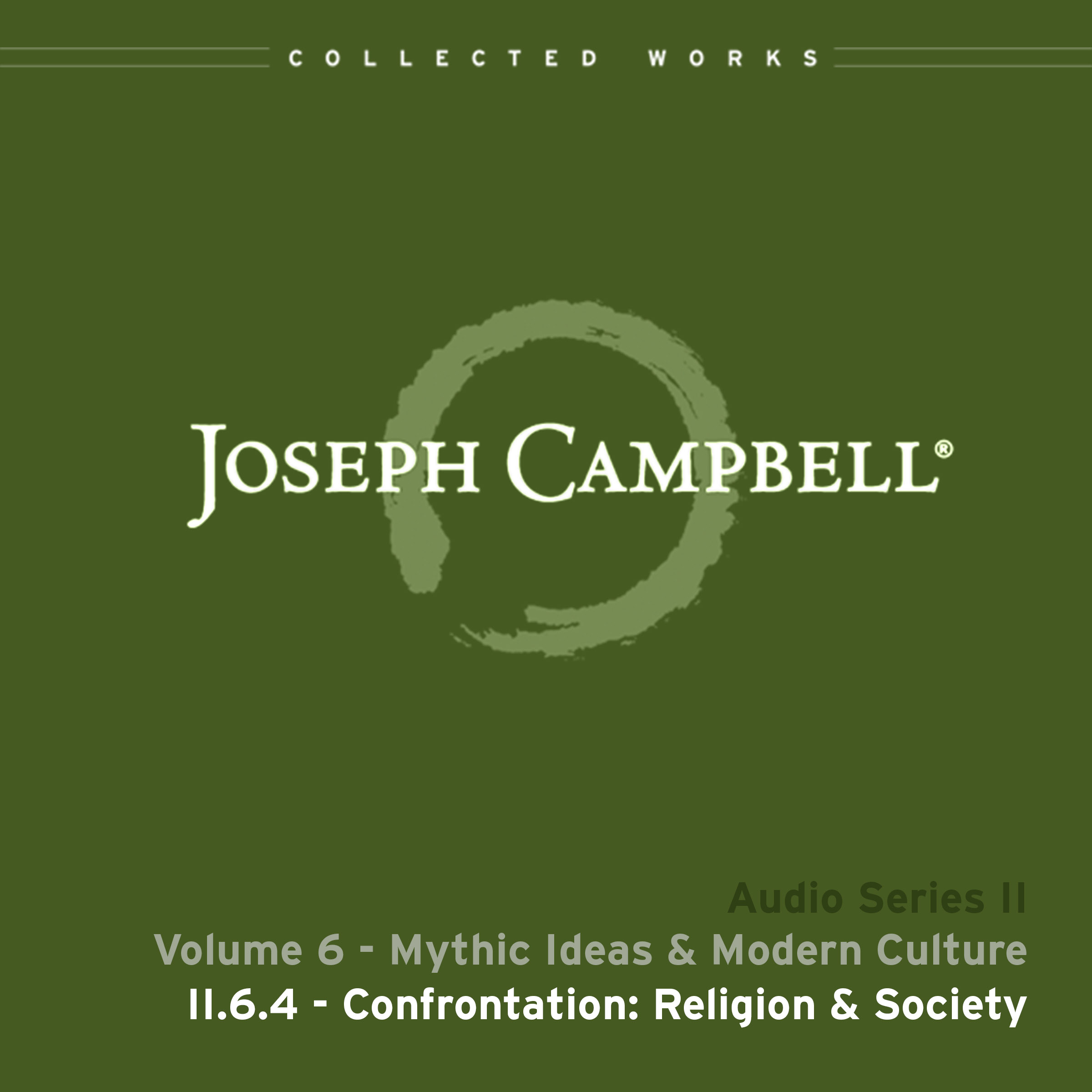
Campbell looks at what happens when you mix religion and society. He begins by looking at the recognition of the divine, and brings us to a conclusion of the affirmation of life. How? Listen as Joe offers his thoughts on the troubadour tradition, the role of an individual and scientific advancements.
Mythology & Art (Audio: Lecture II.6.5)
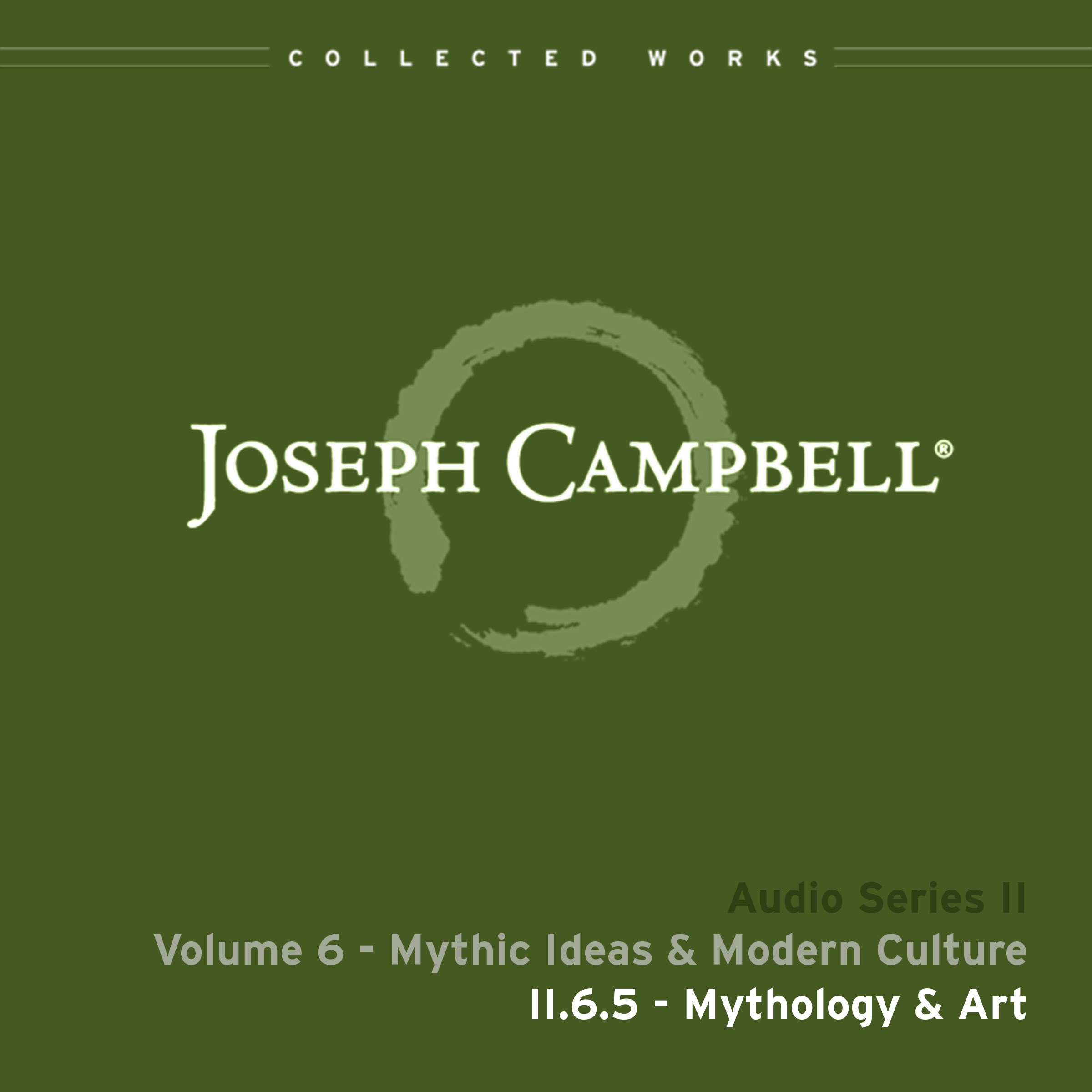
In this unique lecture Joseph Campbell speaks about “proper and improper art” following a dance presentation by his wife, Jean Erdman. His commentary on mythology and art covers an eastern perspective of art and how that relates to mythology of today.
The Psychological Basis of Freedom (Audio: Lecture II.6.2)
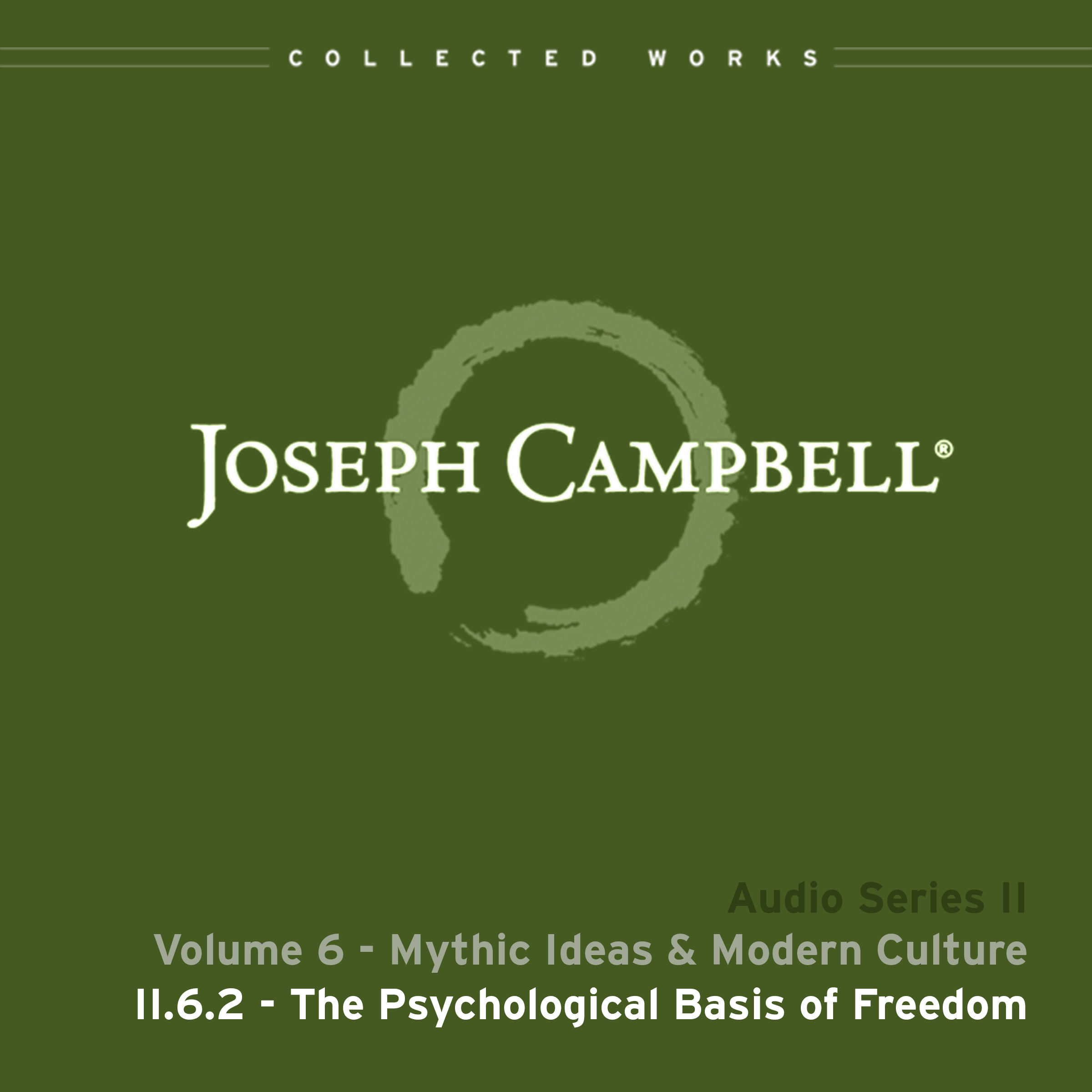
Speaking at Bennett College in Greensboro NC, Joseph Campbell addresses the psychological perspective of freedom as it relates to Modern Man. He touches on Roman perspectives and the “Tree of Enlightenment” and once again reminds us of the importance of acting out of our center.
Modern Myths of Quest (Audio: Lecture II.6.1)
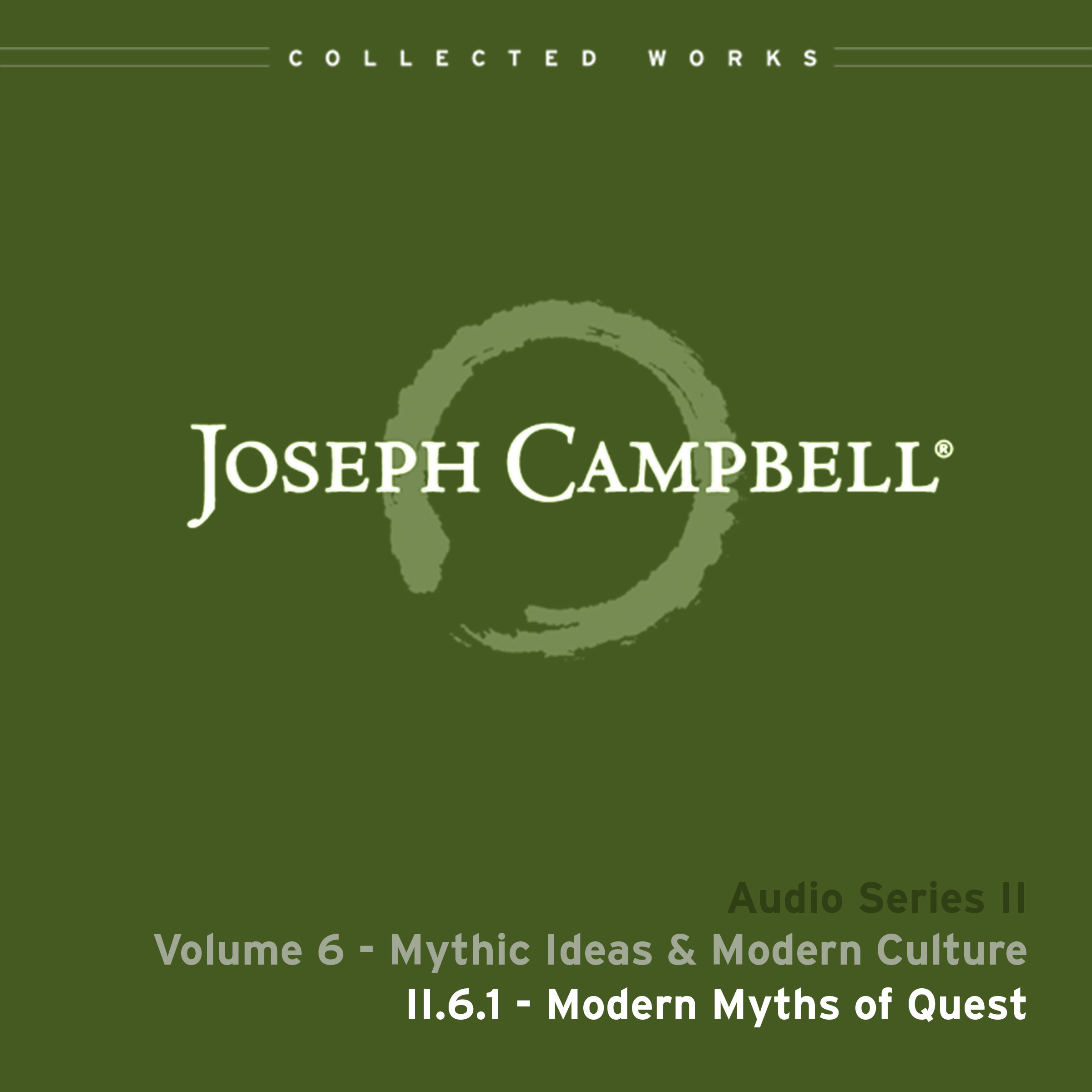
Myths do a number of things for us - from social and cultural to psychological and spiritual. Joseph Campbell offers a modern perspective on the Illumination of myths. After delving into the perspectives of Jung and Freud, Joe ties these ideas to the modern works of James Joyce and Thomas Mann, showing how the human psyche gives shape to the Hero's Journey as illustrated in these novelists' masterworks. "I take the little myth of Santa Claus as an extremely eloquent example. The child must think of Santa Claus in a certain way. It's daddy however. And one fine day that child has to become Santa Claus and put on the whiskers and be daddy with the sentiments and the parental spirit of sympathy and playful loving accord that that image represents. And it’s a bit this way my dear friends with the rather crude images of God and so forth that are presented to our children."
